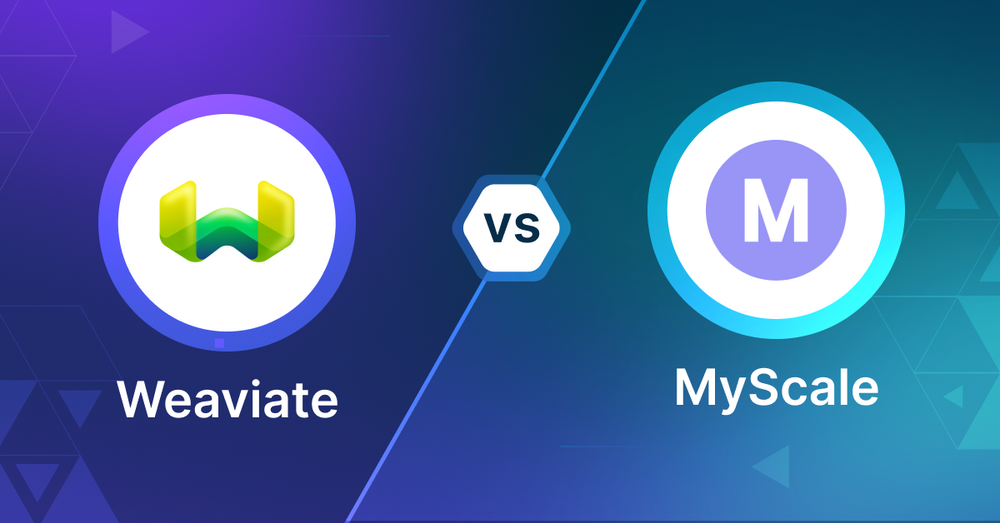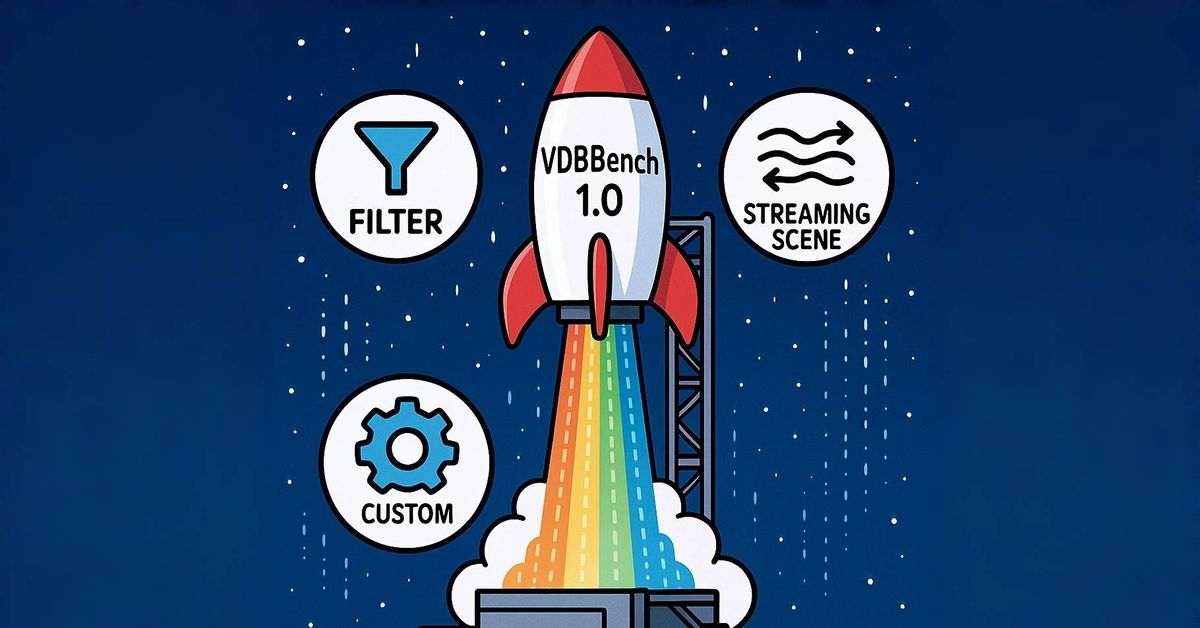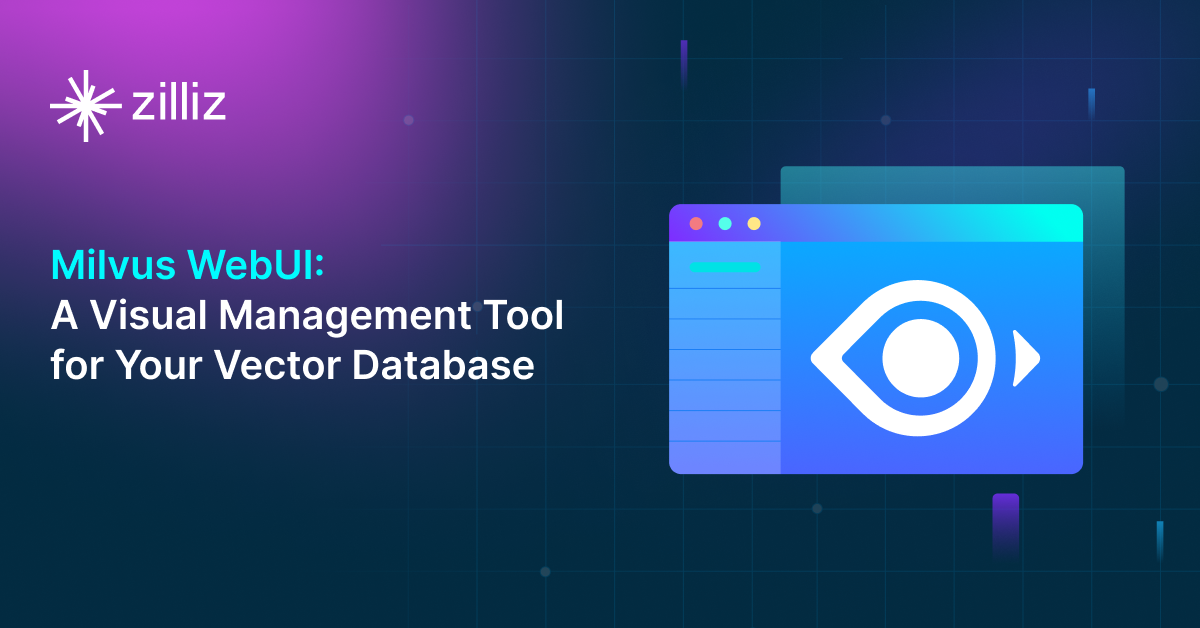OpenSearch vs MyScale: Selecting the Right Database for GenAI Applications

As AI-driven applications evolve, the importance of vector search capabilities in supporting these advancements cannot be overstated. This blog post will discuss two prominent databases with vector search capabilities: OpenSearch and MyScale. Each provides robust capabilities for handling vector search, an essential feature for applications such as recommendation engines, image retrieval, and semantic search. Our goal is to provide developers and engineers with a clear comparison, aiding in the decision of which database best aligns with their specific requirements.
What is a Vector Database?
Before we compare OpenSearch and MyScale, let's first explore the concept of vector databases.
A vector database is specifically designed to store and query high-dimensional vectors, which are numerical representations of unstructured data. These vectors encode complex information, such as the semantic meaning of text, the visual features of images, or product attributes. By enabling efficient similarity searches, vector databases play a pivotal role in AI applications, allowing for more advanced data analysis and retrieval.
Common use cases for vector databases include e-commerce product recommendations, content discovery platforms, anomaly detection in cybersecurity, medical image analysis, and natural language processing (NLP) tasks. They also play a crucial role in Retrieval Augmented Generation (RAG), a technique that enhances the performance of large language models (LLMs) by providing external knowledge to reduce issues like AI hallucinations.
There are many types of vector databases available in the market, including:
- Purpose-built vector databases such as Milvus, Zilliz Cloud (fully managed Milvus)
- Vector search libraries such as Faiss and Annoy.
- Lightweight vector databases such as Chroma and Milvus Lite.
- Traditional databases with vector search add-ons capable of performing small-scale vector searches.
OpenSearch is an open source search and analytics suite with vector search as an add-on; MyScale is a database built on ClickHouse that combines vector search and SQL analytics.
What is OpenSearch? An Overview
OpenSearch is a robust, open-source search and analytics suite that manages a diverse array of data types, from structured, semi-structured, to unstructured data. Launched in 2021 as a community-driven fork from Elasticsearch and Kibana, this OpenSearch suite includes the OpenSearch data store and search engine, OpenSearch Dashboards for advanced data visualization, and Data Prepper for efficient server-side data collection.
Built on the solid foundation of Apache Lucene, OpenSearch enables highly scalable and efficient full-text searches (keyword search), making it ideal for handling large datasets. With its latest releases, OpenSearch has significantly expanded its search capabilities to include vector search through additional plugins, which is essential for building AI-driven applications. OpenSearch now supports an array of machine learning-powered search methods, including traditional lexical searches, k-nearest neighbors (k-NN), semantic search, multimodal search, neural sparse search, and hybrid search models. These enhancements integrate neural models directly into the search framework, allowing for on-the-fly embedding generation and search at the point of data ingestion. This integration not only streamlines processes but also markedly improves search relevance and efficiency.
Recent updates have further advanced OpenSearch's functionality, introducing features such as disk-optimized vector search, binary quantization, and byte vector encoding in k-NN searches. These additions, along with improvements in machine learning task processing and search query performance, reaffirm OpenSearch as a cutting-edge tool for developers and enterprises aiming to fully leverage their data. Supported by a dynamic and collaborative community, OpenSearch continues to evolve, offering a comprehensive, scalable, and adaptable search and analytics platform that stands out as a top choice for developers needing advanced search capabilities in their applications.
What is MyScale? An Overview
MyScale is a cloud based database built on top of the open source ClickHouse database, designed for AI and machine learning workloads. It can handle structured and vector data and real time analytics and machine learning. MyScale is focused on time series, vector search and full text search so it’s good for real time processing and AI driven insights. By using ClickHouse architecture, MyScale is high performance and scalable for AI.
One of the key features of MyScale is native SQL support which simplifies AI driven queries by integrating vector search, full text search and traditional SQL queries in one system. This reduces the need for multiple tools and makes it scalable for AI. MyScale supports and manages analytical processing of both structured and vectorized data on one platform using OLAP database architecture to operate on vectorized data. Developers can interact with MyScale using SQL so it’s accessible to all programmers familiar with relational databases.
MyScale has multiple vector index types and similarity metrics to support different use cases. It supports common distance metrics like Euclidean distance (L2), inner product (IP) and cosine similarity. The database has multiple indexing algorithms: MSTG (Multi-Scale Tree Graph), ScaNN, IVFFLAT, IVFPQ, IVFSQ and HNSW, each with its own set of parameters to tune. MyScale’s proprietary MSTG vector engine uses NVMe SSDs to increase data density so it outperforms specialized vector databases in both performance and cost.
By combining the functionality of an SQL database, vector database and full text search engine into one system MyScale reduces infrastructure and maintenance costs. This unification allows for joint data queries and analytics and a single data foundation for AI applications. MyScale also has MyScale Telemetry for full observability of LLM systems so you can monitor and debug efficiently. As data gets more complex MyScale is a future proof solution that can handle newer data modalities and database sizes while keeping computing performance and integration between different data types.
Comparing OpenSearch and MyScale for GenAI
Search Methodology
OpenSearch is built on Apache Lucene and has evolved to include advanced search functionalities like vector search, semantic search, and hybrid models, making it highly adaptable for AI-driven applications. It now incorporates machine learning-powered methods for on-the-fly embedding generation, enhancing the accuracy and relevance of search results.
MyScale, based on the ClickHouse architecture, also offers a robust search capability but with a focus on integrating SQL with vector and full-text searches. This integration makes MyScale particularly suited for AI and machine learning workloads, simplifying complex queries across diverse data types.
Data Handling
OpenSearch handles a wide range of data types including structured, semi-structured, and unstructured data, supported by features like disk-optimized vector search and binary quantization. Its flexibility allows for efficient processing and storage of vast datasets.
MyScale focuses on structured and vector data, leveraging ClickHouse’s OLAP capabilities to efficiently process time series, vector, and full-text data. It supports various vector index types and similarity metrics, enhancing its capability to handle AI-specific data requirements.
Scalability and Performance
OpenSearch is designed for scalability, managing large datasets effectively across distributed environments. Its latest updates enhance its ability to perform complex searches without sacrificing performance.
MyScale emphasizes performance and scalability in AI applications, using advanced indexing algorithms and NVMe SSDs to improve data density and query speed. It is engineered to outperform specialized vector databases, offering a scalable solution for modern AI-driven insights.
Flexibility and Customization
OpenSearch offers extensive customization options through its plugins and dynamic community, supporting a wide array of applications and integration scenarios.
MyScale combines SQL, vector, and text search functionalities into a single system, reducing the need for multiple tools and allowing for high customization in AI queries. Its support for multiple indexing algorithms and parameters provides additional flexibility for specific use cases.
Integration and Ecosystem
OpenSearch integrates with a variety of tools and frameworks, benefiting from a strong, collaborative community that drives its continuous evolution.
MyScale provides seamless integration capabilities by combining different database functionalities into one system, facilitating easier management and reduced infrastructure costs. It also features telemetry for monitoring and debugging, enhancing system observability.
Ease of Use
OpenSearch, with its comprehensive features, can have a steeper learning curve, though it is supported by robust documentation and a supportive community.
MyScale offers a familiar SQL interface, making it accessible to programmers used to relational databases, thus potentially lowering the barrier to entry for developing AI-driven applications.
Cost Considerations
OpenSearch can be cost-effective for self-managed deployments but may incur higher operational costs for large, distributed setups.
MyScale claims to reduce infrastructure and maintenance costs by unifying SQL, vector, and text databases into a single system, providing cost-efficiency at scale.
Security Features
OpenSearch includes comprehensive security features such as encryption, role-based access control, and audit logging, suitable for secure enterprise applications.
MyScale details on security were not specified, but given its advanced architecture, it likely includes basic security measures like encryption and access control to protect AI and machine learning workloads.
This comparison now accurately reflects the capabilities and distinctions of OpenSearch and MyScale, providing a clearer perspective on their suitability for different application needs, especially in AI and machine learning contexts.
When to choose Opensearch and MyScale for GenAI
Choose OpenSearch when:
- Complex Search Needs Across Various Data Types: You require advanced search capabilities, including full-text search, semantic search, and vector search, across a mix of structured, semi-structured, and unstructured data.
- Real-Time Analytics and Visualization: Your application benefits from integrating search with real-time analytics and visualizations, making use of OpenSearch Dashboards for interactive data insights.
- Scalable Search Operations: You need a solution that scales efficiently for handling large datasets while maintaining high performance in distributed computing environments.
- Community-Driven Features and Support: You value a robust, collaborative community and ongoing enhancements driven by open-source contributions, ensuring the platform evolves with your needs.
Choose MyScale when:
- AI and Machine Learning Workloads: Your focus is on applications that heavily utilize AI and machine learning, particularly where integrating SQL with vector and full-text search is crucial.
- Unified Database Solution: You prefer a unified system that combines the functionalities of an SQL database, vector database, and full-text search engine, reducing the complexity of managing multiple systems.
- High-Performance Requirements for Large Datasets: You need a database optimized for performance, especially for time series and vector data, using advanced indexing algorithms and hardware optimizations like NVMe SSDs.
- Ease of Use with SQL: You want a database that is accessible to programmers familiar with SQL, making it easier to develop and maintain AI-driven queries without the steep learning curve associated with more complex systems.
Using Open-source VectorDBBench to Evaluate and Compare Vector Databases on Your Own
VectorDBBench is an open-source benchmarking tool designed for users who require high-performance data storage and retrieval systems, particularly vector databases. This tool allows users to test and compare the performance of different vector database systems such as Milvus and Zilliz Cloud (the managed Milvus) using their own datasets, and determine the most suitable one for their use cases. Using VectorDBBench, users can make informed decisions based on the actual vector database performance rather than relying on marketing claims or anecdotal evidence.
VectorDBBench is written in Python and licensed under the MIT open-source license, meaning anyone can freely use, modify, and distribute it. The tool is actively maintained by a community of developers committed to improving its features and performance.
Download VectorDBBench from its GitHub repository to reproduce our benchmark results or obtain performance results on your own datasets.
Take a quick look at the performance of mainstream vector databases on the VectorDBBench Leaderboard.
Read the following blogs to learn more about vector database evaluation.
Further Resources about VectorDB, GenAI, and ML
- What is a Vector Database?
- What is OpenSearch? An Overview
- What is MyScale? An Overview
- Comparing OpenSearch and MyScale for GenAI
- When to choose Opensearch and MyScale for GenAI
- Using Open-source VectorDBBench to Evaluate and Compare Vector Databases on Your Own
- Further Resources about VectorDB, GenAI, and ML
Content
Start Free, Scale Easily
Try the fully-managed vector database built for your GenAI applications.
Try Zilliz Cloud for FreeKeep Reading

How to Build an Enterprise-Ready RAG Pipeline on AWS with Bedrock, Zilliz Cloud, and LangChain
Build production-ready enterprise RAG with AWS Bedrock, Nova models, Zilliz Cloud, and LangChain. Complete tutorial with deployable code.

Announcing VDBBench 1.0: Open-Source VectorDB Benchmarking with Your Real-World Production Workloads
VDBBench 1.0 offers an open-source benchmarking solution for vector databases, emphasizing real-world production conditions, including streaming data and concurrent workloads.

Milvus WebUI: A Visual Management Tool for Your Vector Database
Milvus WebUI is a built-in GUI introduced in Milvus v2.5 for system observability. WebUI comes pre-installed with your Milvus instance and offers immediate access to critical system metrics and management features.
The Definitive Guide to Choosing a Vector Database
Overwhelmed by all the options? Learn key features to look for & how to evaluate with your own data. Choose with confidence.